

Nacidos en los 90: estas son las escritoras que llenan de vísceras la red. Sangre.

Esa es la palabra que define a buena parte de la poesía que encontramos en Internet. Y es curioso, porque cuanta más tecnología rodea a los nuevos escritores surgidos de la red, más vísceras y más intimidad desbordan de sus escritos. La tecnología nos vuelve humanos. O en otras palabras: la frialdad de nuestros dispositivos móviles se ha visto inundada por las ondas de calor que las palabras de todas estas nuevas voces desprenden.
Sangre, y feminismo, y brutalidad, y cariño por la víscera, y amor hacia lo feo, y nueva sinceridad latiendo de pantalla a pantalla, para recordarnos que dentro de nosotros no hay cable sino venas muy finas y alargadas. Para la nueva generación de escritoras nacidas en la red, parece entonces que hay un nexo común. 5 Freewriting Secrets for Being a "Genius". You've heard of freewriting, certainly. At its most basic, it's about forcing your internal editor to stay away while you splash your most raw and unusual thoughts onto the page. In Accidental Genius: Using Writing to Generate Your Best Ideas, Insights, and Content (2nd edition, revised & updated), Mark Levy tells how he uses freewriting, not only to loosen up his writing muscles, but to solve business problems of all kinds.
15 Ways to Get Paid to Write. There’s a really great scene in Sister Act 2 (don’t judge me – that movie’s freaking awesome) where Whoopi Goldberg’s character is telling a very young Lauryn Hill to follow her dreams, quoting a book by poet Rainer Maria Rilke that says “Don’t ask me if you’re a writer.
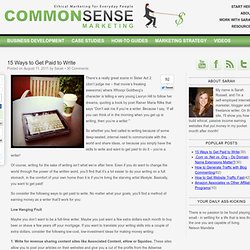
Because I say, ‘If all you can think of in the morning when you get up is writing, then you’re a writer.’” So whether you feel called to writing because of some deep-seated, internal need to communicate with the world and share ideas, or because you simply have the skills to write and want to get paid to do it – you’re a writer! Of course, writing for the sake of writing isn’t what we’re after here. Even if you do want to change the world through the power of the written word, you’ll find that it’s a lot easier to do your writing on a full stomach, in the comfort of your own home than it is if you’re living the starving artist lifestyle. Basically, you want to get paid! Low Hanging Fruit 1. 2. 3. 4. Timothy Hallinan - Writer's Resources.
Finishing Your Novel “A writer is someone who finishes.” -- Thomas Farber This section is for you if:
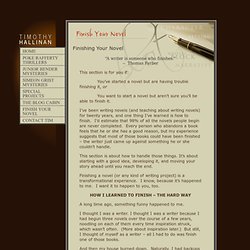
25 Insights on Becoming a Better Writer. When George Plimpton asked Ernest Hemingway what the best training for an aspiring writer would be in a 1954 interview, Hem replied, “Let’s say that he should go out and hang himself because he finds that writing well is impossibly difficult.
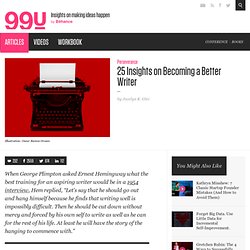
Then he should be cut down without mercy and forced by his own self to write as well as he can for the rest of his life. At least he will have the story of the hanging to commence with.” Today, writing well is more important than ever. Far from being the province of a select few as it was in Hemingway’s day, writing is a daily occupation for all of us — in email, on blogs, and through social media. It is also a primary means for documenting, communicating, and refining our ideas. So what can we do to improve our writing short of hanging ourselves? 1. Don’t just plan to write—write. 2. [The] Resistance knows that the longer we noodle around “getting ready,” the more time and opportunity we’ll have to sabotage ourselves. 3. Zadie Smith’s 10 Rules of Writing. Elmore Leonard's 10 Rules for Writing. Elmore Leonard — author of Get Shorty, Out of Sight, and Rum Punch — died today.
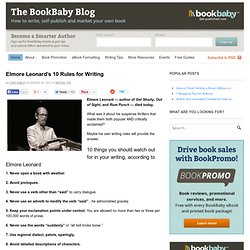
What was it about his suspense thrillers that made them both popular AND critically acclaimed? Maybe his own writing rules will provide the answer. 10 things you should watch out for in your writing, according to Elmore Leonard 1. Never open a book with weather. 2. 3. 4. 5. 6. Stephen King's Top 20 Rules for Writers. Image by the USO, via Flickr Commons In one of my favorite Stephen King interviews, for The Atlantic, he talks at length about the vital importance of a good opening line.
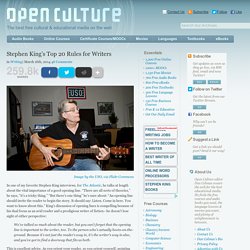
“There are all sorts of theories,” he says, “it’s a tricky thing.” “But there’s one thing” he’s sure about: “An opening line should invite the reader to begin the story. It should say: Listen. Come in here. We’ve talked so much about the reader, but you can’t forget that the opening line is important to the writer, too. This is excellent advice. Revision in the second draft, “one of them, anyway,” may “necessitate some big changes” says King in his 2000 memoir slash writing guide On Writing.
Read These Seven Books, and You’ll be a Better Writer. Donald Miller I used to play golf but I wasn’t very good.

I rented a DVD, though, that taught me a better way to swing, and after watching it a few times and spending an hour or so practicing, I knocked ten strokes off my game. I can’t believe how much time I wasted when a simple DVD saved me years of frustration. I’d say something similar is true in my writing career. If you read these books, your writing will improve to the point people who read your work will begin to comment on how well you write. . • The War of Art by Steven Pressfield: